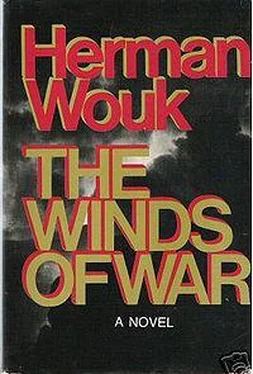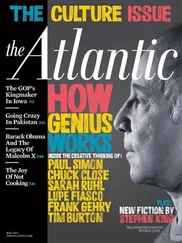Herman Wouk - The Winds of War
Здесь есть возможность читать онлайн «Herman Wouk - The Winds of War» весь текст электронной книги совершенно бесплатно (целиком полную версию без сокращений). В некоторых случаях можно слушать аудио, скачать через торрент в формате fb2 и присутствует краткое содержание. Год выпуска: 1971, Издательство: Collins, Жанр: Историческая проза, на английском языке. Описание произведения, (предисловие) а так же отзывы посетителей доступны на портале библиотеки ЛибКат.
- Название:The Winds of War
- Автор:
- Издательство:Collins
- Жанр:
- Год:1971
- ISBN:нет данных
- Рейтинг книги:4 / 5. Голосов: 1
-
Избранное:Добавить в избранное
- Отзывы:
-
Ваша оценка:
- 80
- 1
- 2
- 3
- 4
- 5
The Winds of War: краткое содержание, описание и аннотация
Предлагаем к чтению аннотацию, описание, краткое содержание или предисловие (зависит от того, что написал сам автор книги «The Winds of War»). Если вы не нашли необходимую информацию о книге — напишите в комментариях, мы постараемся отыскать её.
About the Author
Herman Wouk's acclaimed novels include the Pulitzer-Prize winning
;
;
;
;
;
; and
.
The Winds of War — читать онлайн бесплатно полную книгу (весь текст) целиком
Ниже представлен текст книги, разбитый по страницам. Система сохранения места последней прочитанной страницы, позволяет с удобством читать онлайн бесплатно книгу «The Winds of War», без необходимости каждый раз заново искать на чём Вы остановились. Поставьте закладку, и сможете в любой момент перейти на страницу, на которой закончили чтение.
Интервал:
Закладка:
The gold letters B R E M E N stretched across the curved black stern of the steamship, high over the cobbled waterfront street. Above the letters, an immense red flag rippled in the cool fishy breeze off the Hudson, showing at its center a big black swastika circled in white.
“Glory be, it all really exists,” Madeline said to Warren as she got out of the taxicab.
“What really exists?” Warren said.
“Oh, this whole Hitler business. The Nazis, the Sieg Heils , the book burnings — when you read about it in the papers, it all seems too ridiculous and crazy to be real. But there’s the swastika.”
Victor Henry glanced up at the Nazi flag, wrinkling his whole face. Rhoda was briskly giving the porter orders about the luggage. “I had to get special permission to ride this bucket. Let’s hope the German language practice proves to be worth it. Come aboard with us and have a look at the ship.”
In a first-class stateroom panelled in gloomy carved wood, they sat making melancholy small talk amid piled suitcases and trunks, until Rhoda restlessly jumped up and took Warren with her for a walk around the Bremen . Madeline chose the moment to jolt her father with the news that she wanted to drop out of college. The prospect of living with her dull aunt and duller uncle and twin cousins for two years was unbearable, she said.
“But what can you do? Two years of college, and you keep failing courses,” Victor Henry said. “You can’t just lie around and read Vogue till you get married.”
“I’d find a job, Dad. I can work. I’m just bored at school. I hate studying. I always have. I’m not like you, or Warren. I’m more like Byron, I guess. I can’t help it.”
“I never liked studying,” Commander Henry returned. “Nobody does. You do what you must, and get it done.”
Perched on the edge of a deep armchair, the girl said with her most winning smile, “Please! Let me take just one year off. I’ll prove I can do it. There are lots of jobs for girls at the radio networks in New York. If I don’t make good, I promise I’ll trot back to college, and -”
“What! New York? Nineteen, and alone in New York? Are you nuts?”
“Let me just try it this summer.”
“No. You’ll go with Aunt Augusta to Newport, the way it’s been planned. You’ve always enjoyed Newport.”
“For a week, yes. A whole summer will be a perishing bore.”
“That’s where you’ll go. In the fall I’ll expect regular letters from you, reporting improved performance in college.”
Madeline, slumping back in the armchair, bit noisily into an apple from a heaping bon voyage basket of fresh fruit, sent by Kip Tollever. Staring straight ahead, except for brief mutinous glares at her father, she gnawed at the apple until her mother and brother returned. Pug did his best to ignore the glares, reading a book on German steel-making. He did not like parting from his daughter on such terms, but her proposal seemed to him unthinkable.
The Bremen sailed at noon. As Warren and Madeline left the pier, a band thumped out a merry German waltz. They took a taxi uptown, saying little to each other. Henry had set the uncommunicative pattern of the family; the children, after romping and chattering through their early years, had from adolescence onward lived separate, largely undiscussed lives. Warren dropped Madeline at Radio City, not inquiring what she intended to do there. They agreed to meet for dinner, go to a show, and take a midnight train to Washington.
Madeline poked here and there in the huge lobby of the RCA building, gawking at the Sert murals and ceiling paintings. She found herself at the bank of elevators for NBC entertainers and employees. Many of these people, she noticed, showed no pass to the uniformed page, but smiled, waved, or just walked busily past the roped entrance. She sailed past too, trying to look twenty-five and employed. Squinting at her, the page held out an arresting hand. She dived into a crowded elevator.
For an hour she wandered the inner halls of the broadcasting company, relishing the thick maroon carpets, the immense round black pillars, the passing trucks of spotlights and broadcast equipment, the flashing red lights outside of studios, the pretty girls and handsome young men hurrying in and out of doors. She came on the employment office and hung outside, peering through the open double doors like a child at a candy counter. Then she left and spent the day shopping in department stores.
As for Warren, the taxi took him a few blocks further uptown. In Rumpelmayer’s, he met a good-looking woman of thirty or so with large sad eyes, a cloud of ash-blonde hair, and a clever soulful way of talking about novels, paintings, and music, subjects which did not greatly interest him. His majors had been history and the sciences. After an early lunch, he spent the day with her in a hotel bedroom. That did interest him.
When he dined with his sister that evening, Madeline helped herself to a cigarette from his pack on the table, and lit and smoked it inexpertly. Her defiant, self-satisfied, somewhat pathetic air made Warren laugh. “When the cat’s away, hey?” he said.
“Oh, I’ve been smoking for years,” Madeline said.
The three blasts of the ship’s horn, the pier girders moving outside the porthole, the band far below crashing out “The Star-Spangled Banner,” touched a spring in Rhoda. She turned to her husband with a smile such as he had not seen on her face for weeks, threw her arms around him, and gave him an aroused kiss, opening her soft familiar lips.
“Well! We made it, Pug, didn’t we? Off to Deutschland. Second honeymoon and all that! Mmm!”
This mild pulse of sex in his hitherto preoccupied and cross wife was like a birthday present to the monogamous Pug. It augured well for the crossing, and possibly for the entire sojourn in Berlin. He pulled her close.
“Well!” Rhoda broke free, with a husky laugh and shiny eyes. “Not so fast, young fellow. I want a drink, that’s what I want, and I don’t care if the sun isn’t over the yardarm. And I know just what I want. Champagne cocktail, or two, or three.”
“Sure. Let’s have it right here. I’ll order a bottle.”
“Nothing doing, Pug. This will be a nice long crossing. We’re getting out of here and going to the bar.”
The ship was clearing the dock and hooting tugs were turning it south, as the deck started to vibrate underfoot.
A crowd of tired-looking jocund voyagers already filled the bar, making a great noise.
“I thought there was a war scare,” Rhoda said. “Nobody here seems to be worried.”
They found two stools at the bar. Rhoda said, holding up her champagne cocktail, “Well, to whom?”
“The kids,” Pug said.
“Ah, yes. Our abandoned nestlings. All right, to the kids.” As she polished off the champagne, Rhoda talked excitedly about the fine accommodations of the Bremen . She felt very adventurous, she said, sailing on a German ship these days. “Pug, I wonder if there are any Nazis right here in this bar?” she prattled.
The fat red-faced man sitting next to Rhoda shifted his glance to her. He wore a feathered green hat and he was drinking from a stein.
“Let’s take a walk on deck,” Pug said. “See the Statue of Liberty.”
“No, sir. I want another drink. I’ve seen the Statue of Liberty.”
Pug made a slight peremptory move of a thumb, and Rhoda got off the stool. When anything touched his Navy work, Pug could treat her like a deckhand. He held open a door for her, and in a whipping wind they walked to the stern, where gulls swooped and screeched, and passengers clustered at the rails, watching the Manhattan buildings drift past in brown haze.
Читать дальшеИнтервал:
Закладка:
Похожие книги на «The Winds of War»
Представляем Вашему вниманию похожие книги на «The Winds of War» списком для выбора. Мы отобрали схожую по названию и смыслу литературу в надежде предоставить читателям больше вариантов отыскать новые, интересные, ещё непрочитанные произведения.
Обсуждение, отзывы о книге «The Winds of War» и просто собственные мнения читателей. Оставьте ваши комментарии, напишите, что Вы думаете о произведении, его смысле или главных героях. Укажите что конкретно понравилось, а что нет, и почему Вы так считаете.












